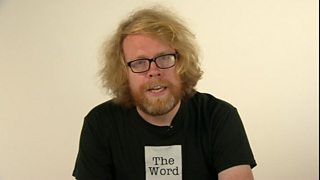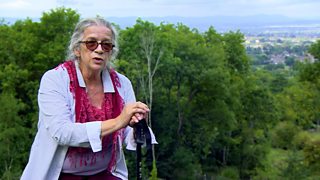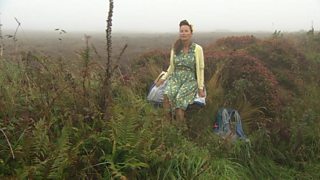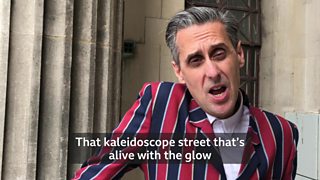National Poetry Day: #大象传媒LocalPoets celebrates 12 exciting new poems on the theme of change
4 October 2018
This year for National Poetry Day, #大象传媒LocalPoets celebrates 12 exciting new poems on the theme of change. The poets are based in one of the 大象传媒’s 12 regions in England, and were inspired by listeners, local people, landscapes and language. One of the dozen, Kate Fox, offers her own take on the power of poetry to explore change.

Kate Fox is a celebrated performance poet, writer and Northern wit.
I remember once I was about to start a poetry project in a primary school. I was going to be working with two teachers and all of Year Five. One of the teachers was really up for it. The other wondered why on earth she’d been lumbered with a poet when she had a curriculum to teach and tests to pass. She said to me over staff-room coffee and biscuits that poetry just “isn’t very useful”.
A poem can be sitting there for hundred of years, then suddenly hit the right person at the right time and - bam! - it can still change minds and hearts.
I bent over backwards to show her that poetry could be building blocks for all sorts of other writing. It could allow you to make comparisons between different things, and make the creative leaps which are the basis of science as well as the arts. It could make you a better observer, more patient and more able to pay attention. I more or less told her that, as well as getting her students better grades and making her a nicer person, it could also grout the bathroom and make the tea.
However, what I didn’t say, because I didn’t want her to think poets are even weirder than she already did, was that I believe poems are what Robert Graves called “stored magic”. They can act as a sort of spell to change the world.
Maybe not straight away. A poem can be sitting there for hundred of years, then suddenly hit the right person at the right time and- bam!- it can still change minds and hearts. For example, Leonard Cohen’s True Love Leaves No Traces (As the mist leaves no scar/on that dark green hill/so my body leaves no scar/on your nor ever will) was a poem that got me through important early relationships that both me and my partners knew were doomed not to last.
I was really pleased when 大象传媒 Radio York listeners got in touch with their stories. In my poem I took account of the differences in scale between everyday changes that people worry about, like the noise of kids in the street or whether they can still get their favourite brand of yoghurt, and major life turning points like moving house or continent. I also wanted to repudiate the idea that Yorkshire is stuck in the past and timeless. It changes all the time.
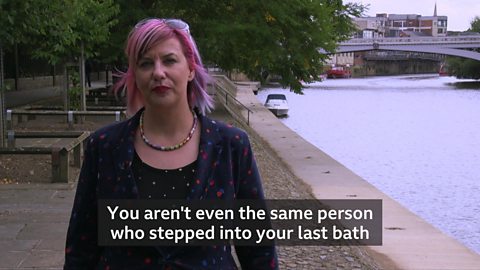
Everything Flows by Kate Fox / 大象传媒 Radio York
The ebb and flow of Yorkshire's rivers represent a place in constant change.
Once I’d made a rough draft I asked my Facebook network, which includes a lot of poets, to comment on what I’d written and I incorporated some of these ideas in the finished poem.
Poetry takes us back to songs round the fire and to folk rhymes. Speaking a poem in front of a live audience is still my favourite way to share poetry.
That represents quite a big change in terms of how it’s possible to work nowadays. Though at the same time, one of the things about poetry is that it is a very basic and ancient way of communicating. It takes us back to songs round the fire and to folk rhymes. Speaking a poem in front of a live audience is still my favourite way to share poetry.
Two of the poems this year have elements of myth and folklore as a springboard – Kirsten Irving writes about the Lincolnshire imp, a traditional symbol of mischief, who takes a journey to see the seals at Donna Nook. Abigail Parry’s links to the Solent area and the sea-faring rituals of the coast inspired her poem, Scylla.
In contrast to this, John Clegg (Cambridge) creates an imagining of the future dedicated to his small daughter. In it, he imagines her forty years in the future, visiting a nuclear fission plant just outside Bassingbourn in South Cambridgeshire and it’s about the kind of changes we need to make in order to stay the same.
See the sense of a city鈥檚 solidarity and defiance that Tony Walsh expressed with his This Is the Place after the Manchester bombing last May.
The role of poets changes across societies and times. Although poetry bestsellers are pretty rare, it’s heartening to see examples of poetry used in public life to effect change. See the sense of a city’s solidarity and defiance that Tony Walsh expressed with his This Is the Place after the Manchester bombing last May, or the “stored magic” Serena Williams was releasing when she quoted Maya Angelou’s Still I Rise at Wimbledon.
It’s great to have a wealth of female voices in these change poems. One of the younger female poets is Momtaza Mehri (London) with hard-won wisdom from a fast-moving city, then there is Sebbie (Coventry) and Nicole May (Manchester). Angela France (Gloucestershire) provides another perspective as her poem celebrates the joyous creativity maturity can bring, while Katrina Naomi (Cornwall) describes a countrywoman's affair.
Female Voices
These poems can speak with and for these people and places.
There are poems that celebrate the changes in places I love, like Andrew Graves' Nottingham and Rowan McCabe's dialect tour of Newcastle with the fabulous word “Muckle”, meaning big.
Poets have an increasing role in what’s fashionably called “place-making”. Really, I think that means they have their ear to the ground and are paying attention to the people and places around them. These poems can speak with and for these people and places, and perhaps provide some comfort (alongside due senses of caution and dread!) as we head into futures in which the only constant will be change.
Confronting big changes
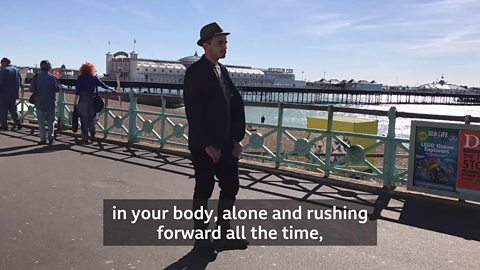
The Zigzag Path by John McCullough / 大象传媒 Sussex
A tree in Preston Park hung with trainers is a mark of changes to the natural world.
More from 大象传媒 Arts
-
![]()
Picasso鈥檚 ex-factor
Who are the six women who shaped his life and work?
-
![]()
Quiz: Picasso or pixel?
Can you separate the AI fakes from genuine paintings by Pablo Picasso?
-
![]()
Frida: Fiery, fierce and passionate
The extraordinary life of Mexican artist Frida Kahlo, in her own words
-
![]()
Proms 2023: The best bits
From Yuja Wang to Northern Soul, handpicked stand-out moments from this year's Proms


